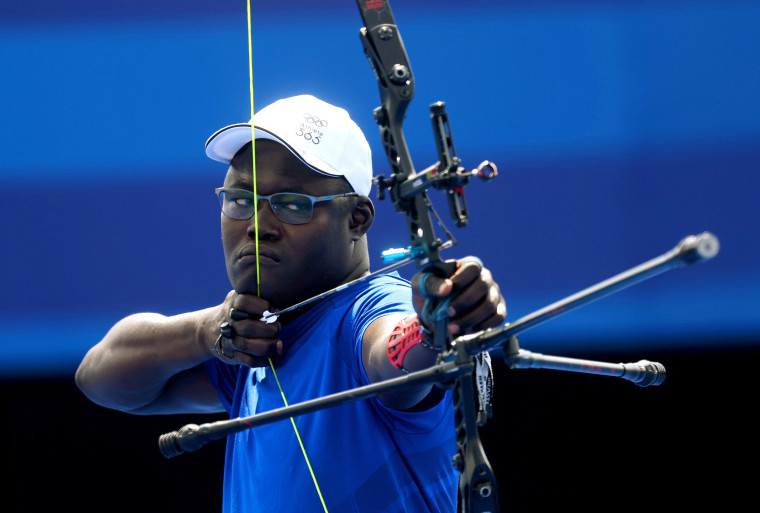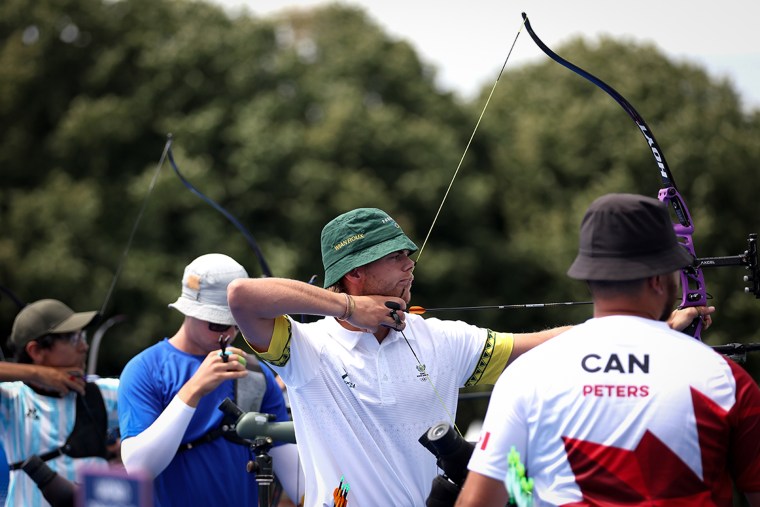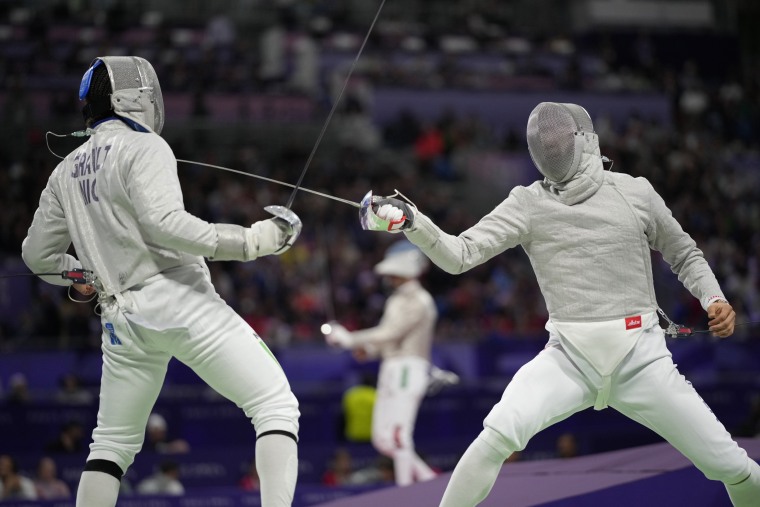Olympians who finish near the bottom still marvel at what it took to get to Paris
PARIS — Even if Israel Madaye had skewed all of his arrows way off target and scored zero points, the archer from Chad in central Africa wouldn’t have cared.
Though he came last in his event, just getting to Paris 2024 was a colossal achievement. He will always be one of the 10,500 athletes competing here who can call themselves Olympians, able for the rest of their lives to sign the honorific OLY after their names.
“My dream was to qualify for Paris,” said Madaye, 36, who lives in the Chadian capital of N’Djamena. “I always said that even if I scored zero points, I would still be pleased with my achievements because I worked very hard to get here.”
Although Madaye came 64th out of 64 competitors, perhaps the correct way to see it is that he is the worst, best male archer in the world. The 64th most elite bowsman to draw an arrow from a quiver, a phenomenal accolade given he has had to scrape together funding and equipment, his sport almost unheard of in his homeland.

“It was a huge achievement for me and my coach, and we really struggled without certain equipment and without suitable training conditions,” he told NBC News. “But we didn’t give up.”
Madaye also stands as a reminder that, for most athletes here in Paris, this is not about medals or podiums or press conferences or TikToks or sponsorship deals. Only around 1,000 golds, silvers and bronzes will be handed out, but everyone here has made huge sacrifices and attained levels of sporting prowess that dwarf the efforts of mere mortals.
Edda Hannesdóttir, 29, overcame a cruel string of injuries, including two operations in the past four years, to become Iceland’s first-ever Olympic triathlete. That she finished in 51st place was almost a side note; just getting to the highest stage of her discipline was a dream fulfilled.
Qualification was “a really hard and grueling process,” she said. “it’s very competitive and difficult, even more so for someone like me from a very small country that doesn’t have a lot of economic support.” She had to self-fund traveling to races around the world, leaning on “help from family just to be able to get to the start line,” she added. “I have a lot of respect for everyone that makes it.”
Many of these contenders do this largely unsung work while leading otherwise regular lives.
Brazilian judoka Natasha Ferreira is a trained psychologist, a navy third sergeant and a mother to her son, Enzo, 8. After traveling 6,000 miles from her home city of Curitiba, her Parisian sporting journey was over in 45 seconds, defeated in the first round of the women’s -48kg judo by eventual gold medalist Natsumi Tsunoda of Japan.
“I really wanted to win a medal,” said Ferreira, 25. But whatever happened, “I already knew it would be a great experience, because the Olympic Games are the biggest event in the world and everything that revolves around the Games becomes spectacular.”
Far away from the venues, talking to athletes milling around the Olympic village, it is clear there is some sort of fraternal or sororal bond between many of them that, for this noblest of sporting trials, transcends other more quotidian events.
There’s a “different sense of respect among each other once that everyone gets to the Olympics,” said Wien Roux, 21, a South African who placed one point above Madaye in the archery ranking round. “It’s a very small group of people competing here so it’s quite amazing to be one of those.”

He knew getting close to a medal “would be a very, very long shot” but described the heartening experience of being able to hang out with stars of the sport.
“Even among the top people, like the USA’s Brady Ellison who won the silver medal, we were chatting like we had known each other for years,” Roux said. “I wouldn’t think someone like that would have the time at a normal competition to have chats with every single person.”
Roux used the downtime to watch his homeland win bronze in the rugby sevens, a major passion for many South Africans like him.
“It was quite the experience,” he said. “I’ve been able to take in the Games as a spectator not just an athlete. So it was quite cool to watch other sports and support the rest of my team.”
And of course being in Paris, few can resist interspersing their training and competition days with sightseeing and gastronomy.
“Even though I didn’t stay long, I managed to make the most of it,” said Ferreira, the Brazilian judoka. “I went to the Eiffel Tower with my family, I went to watch other events besides judo and I really enjoyed the Olympic Village.”
Some are having such a great time they’ve stuck around.
“I had fun and I’m still having fun,” said Evann Girault, 19, a fencer from Niger, who lost 15-8 in the first saber round against South Korea’s Oh Sanguk, the eventual winner. Girault lives in the French city of Orleans, just 70 miles south of Paris, so he’s been able to give himself something of a post-competition vacation.

“Throughout Olympic preparation, you have to restrict yourself, limit your outings and manage your recovery,” he said. “Once that’s over, you can release the pressure and enjoy yourself.”
“I went out to visit Paris where I enjoyed the nightlife and the late-night parties,” he added. “Being able to meet lots of people from different backgrounds is an incredible and enriching experience.”





